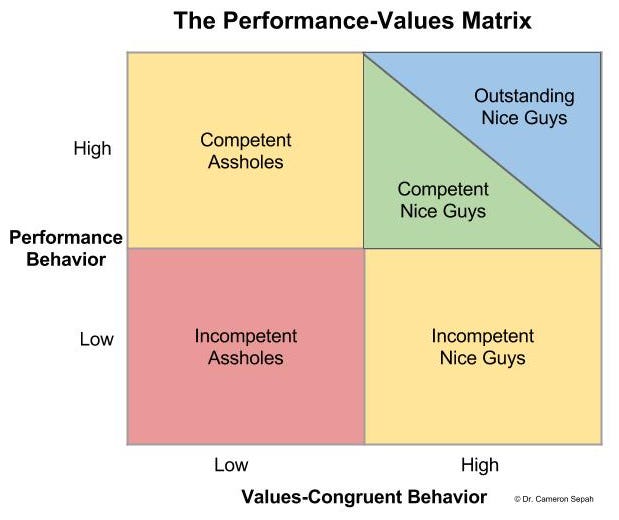- Adam Grant On Interviewing to Hire Trailblazers, Nonconformists and Originals | First Round Review
“By default, companies are built in the image of their founders, which is why it’s vital to proactively introduce diversity of thought… ‘What happens when startups get successful and grow is that they become more and more vulnerable to the attraction-selection-attrition cycle, where people of the same stripes are increasingly drawn to the organization, chosen by it and retained at it. The way to combat that homogeneity creep is to proactively infuse the culture with originals, who have the will and skill to think differently'”. - How to Hire | eShares
Four principles and six heuristics on hiring. Some of them are counter-intuitive, and all of them turn what we think we know about hiring on its head. - Your Company’s Culture is Who You Hire, Fire, & Promote | @DrSepah
The writer presents a powerful Performance Value Matrix based on the following with the following categories and rules: Incompetent Assholes (Fire Fast); Competent Assholes (Remediate or Separate); Incompetent Nice Guys (Manage or Move); Competent and Outstanding Nice Guys (Praise and Raise). - The No Asshole Rule: Part 1 | HuffPost
There are myriad costs to keeping employees who engage in demeaning behaviour in an organisation: From how detrimental they are to the mental and physical health of their colleagues, to the overall undermining of learning and organisational effectiveness. - Why I Wrote The No Asshole Rule | Harvard Business Review
“My father always told me to avoid assholes at all costs, no matter how rich or powerful they might be, because I would catch their nastiness and impose it on others. I learned, as an organizational psychologist, that his advice is supported by research on ’emotional contagion’: if you work for a jerk, odds are you will become one”.
Tag - work
That feeling when all you need to buy is one – one – laundry net but you are stuck behind Man Who Feels The Need To Buy Everything In The Japan Home Store, in the only check-out queue manned by World’s Most Meticulous And Organised Cashier, who waits patiently for the same man to count out his cash to the cent ($107.90), while you have enough time to write and edit this post, including redundant and extraneous – tautological, perhaps – words, bearing in mind that the genesis of this sentiment took place some five – five – minutes ago…
…was how I felt this weekend when I popped into the shop for what I thought was a quick purchase, but which ended up taking 10 minutes.
No wonder, then, why AI is coming for everyone’s jobs.
MyPaper interviewed me for a story on Going Local 4.
Going Local is a production by Buds Theatre Company. Find out more from yesterday’s post.
The transcript of my interview, as follows:
- Name, age, occupation:
Mr Laremy Lee, 32, playwright.
I am presently a schools correspondent with The Straits Times. I will be moving to the School of the Arts, Singapore at the end of the month (June 29, 2015), to teach literature and literary arts. - How do you feel about your play being picked as a feature of Going Local 4?
It is both a privilege and an honour to be part of a proud tradition started by Buds Theatre Company’s artistic director Claire Devine. - Summarise Hands Down in 14 words or less.
A married couple discovers their incompatibility while in a competition to win a car. - What inspired your passion for playwriting?
I have always had a love for writing and the English language. Theatre is one of the avenues in which I express myself creatively. - The play on paper can be vastly different from the creature on stage – are you prepared for any potential changes?
Staging a play is like sailing a ship; with all hands on deck, everyone – from cast to crew – works to move the play forward.
As with all ships I’ve built, I leave this vessel in the good hands of the director, who will steer it in the direction she thinks best.
I’m fine with it taking a different tack – so long as it doesn’t go off course. - What do you hope to achieve with Hands Down?
I wrote the play in response to a trend taking place in Singapore society and mirrored in my circle of friends.Because of the way housing policy is designed, many young Singaporean couples ballot for public housing at a young age.
When the key arrives some years later, some of these couples – having grown in age and maturity – realise they are not as in love with each other as they used to be.
Understandably, the sunk cost is, sometimes, perceived as greater than the benefits of backing out of the impending nuptials. These couples end up entering an unhappy marriage, along with all its attendant ills.
Is there a better way for Singapore to enact pro-marriage policies, while balancing housing considerations in a country with limited land? Or is it a case of mismatched expectations versus a practical reality, when it comes to finding a companion and a life partner? I hope the play gets people to start thinking about these issues – or even finding a solution, if possible. - What are some memorable things theatre practitioners have said to you?
One common sentiment expressed by many writers – playwrights, poets, novelists, etc. – whom I know: For every play that goes to stage, or every book that goes to print, there are dozens more that remain as unfinished drafts or rejected manuscripts, languishing in the bottom of the drawer.
The Pareto principle suggests that 80 per cent of an artist’s best output is going to come from 20 per cent of his input. So it could well be that 80 per cent of your time might be spent achieving 20 per cent of your work.
Having said that, don’t settle for inefficiency. Learn from the mistakes you make, and and don’t make the same mistake again. Better yet – get a good mentor who gives good feedback. It’ll cut down the time you’d need to take to get to where you want to go.
Book your tickets here. If you’d like to, you can read the 2012 version of Hands Down here.


